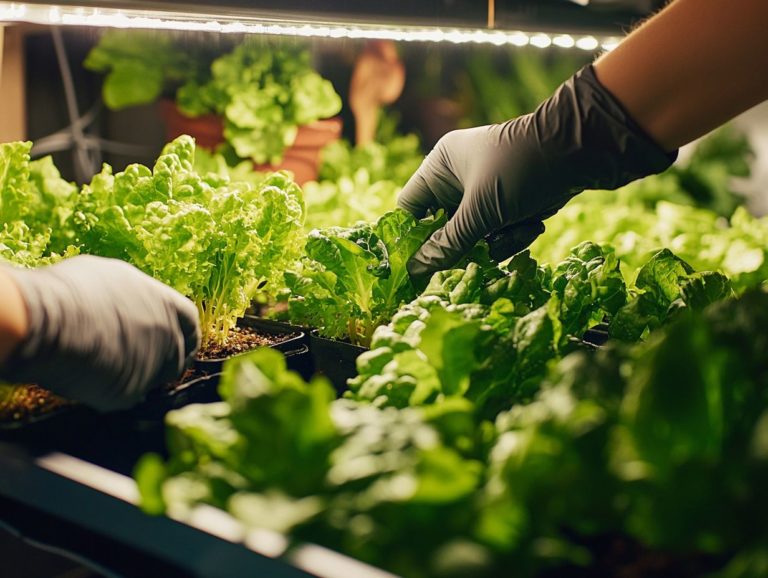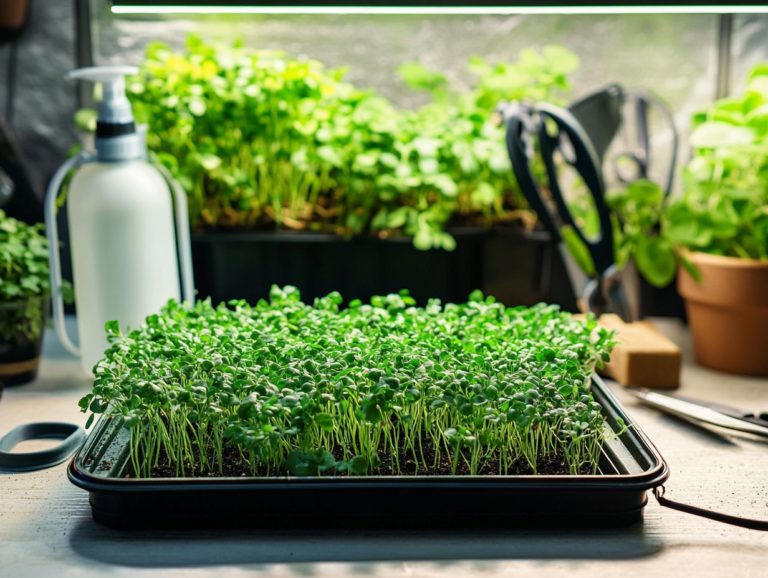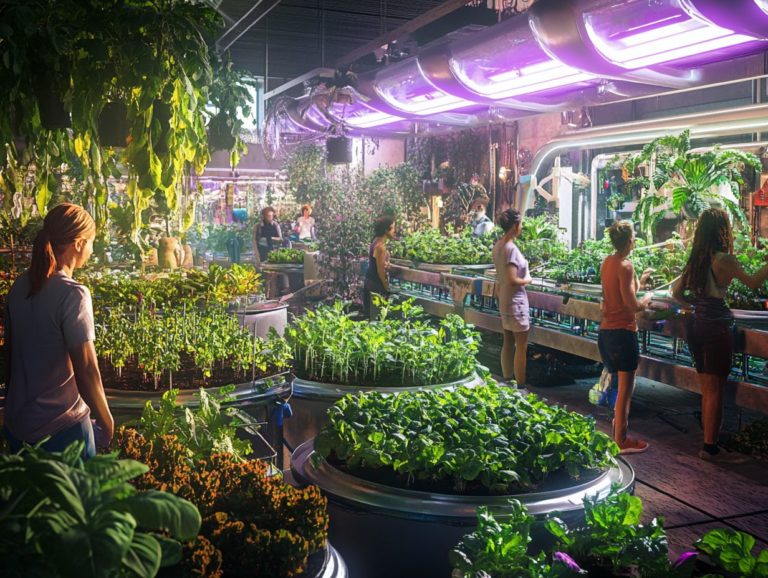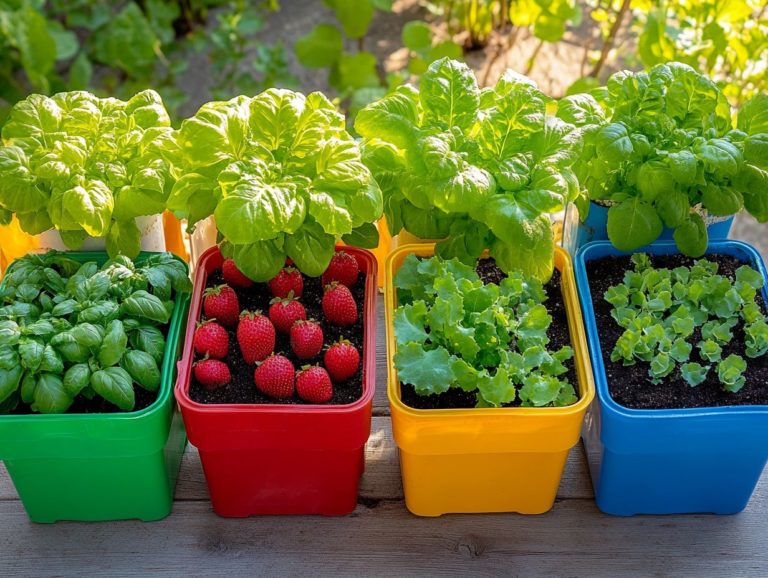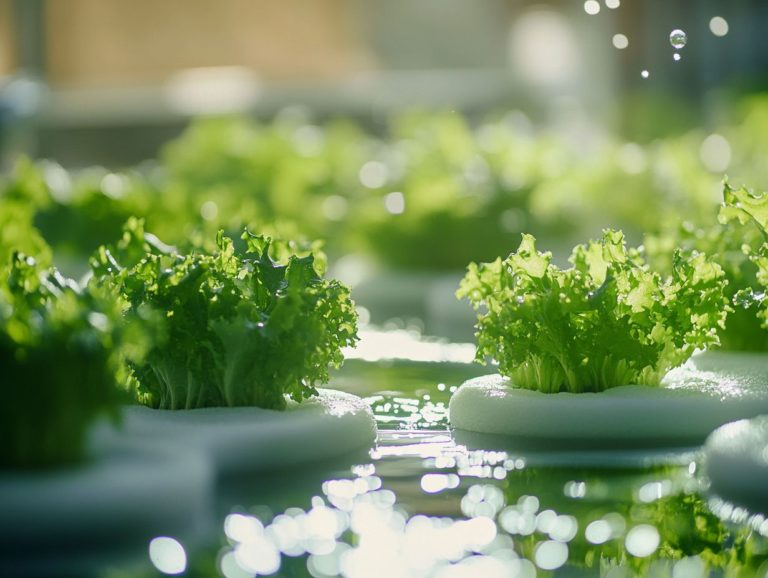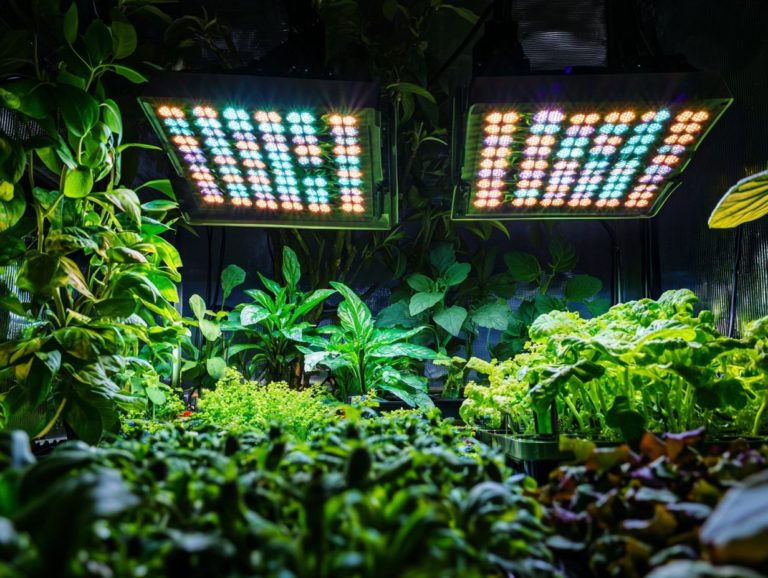What are the Disadvantages of Hydroponic Gardening?
Hydroponic gardening has emerged as a captivating alternative to traditional soil-based methods. It provides an intriguing look into the future of agriculture.
This technique allows you to cultivate plants in water with nutrients, often resulting in faster growth and higher yields. It’s also important to consider the challenges and drawbacks that come with this method.
Let s dive into hydroponic gardening! Discover its exciting advantages and some challenges, along with environmental impacts and cost considerations. Explore with us as we uncover the elements that make this innovative approach both exhilarating and complex.
Contents
- Key Takeaways:
- Overview of Hydroponic Gardening
- Advantages of Hydroponic Gardening
- Disadvantages of Hydroponic Gardening
- Environmental Concerns
- Cost Considerations
- Frequently Asked Questions
- What are the Disadvantages of Hydroponic Gardening?
- Is hydroponic gardening more expensive than traditional gardening?
- Are there any environmental concerns associated with hydroponics?
- Does hydroponic gardening require a lot of maintenance?
- Are there any limitations to what types of plants can be grown hydroponically?
- Is hydroponic gardening suitable for all climates?
Key Takeaways:
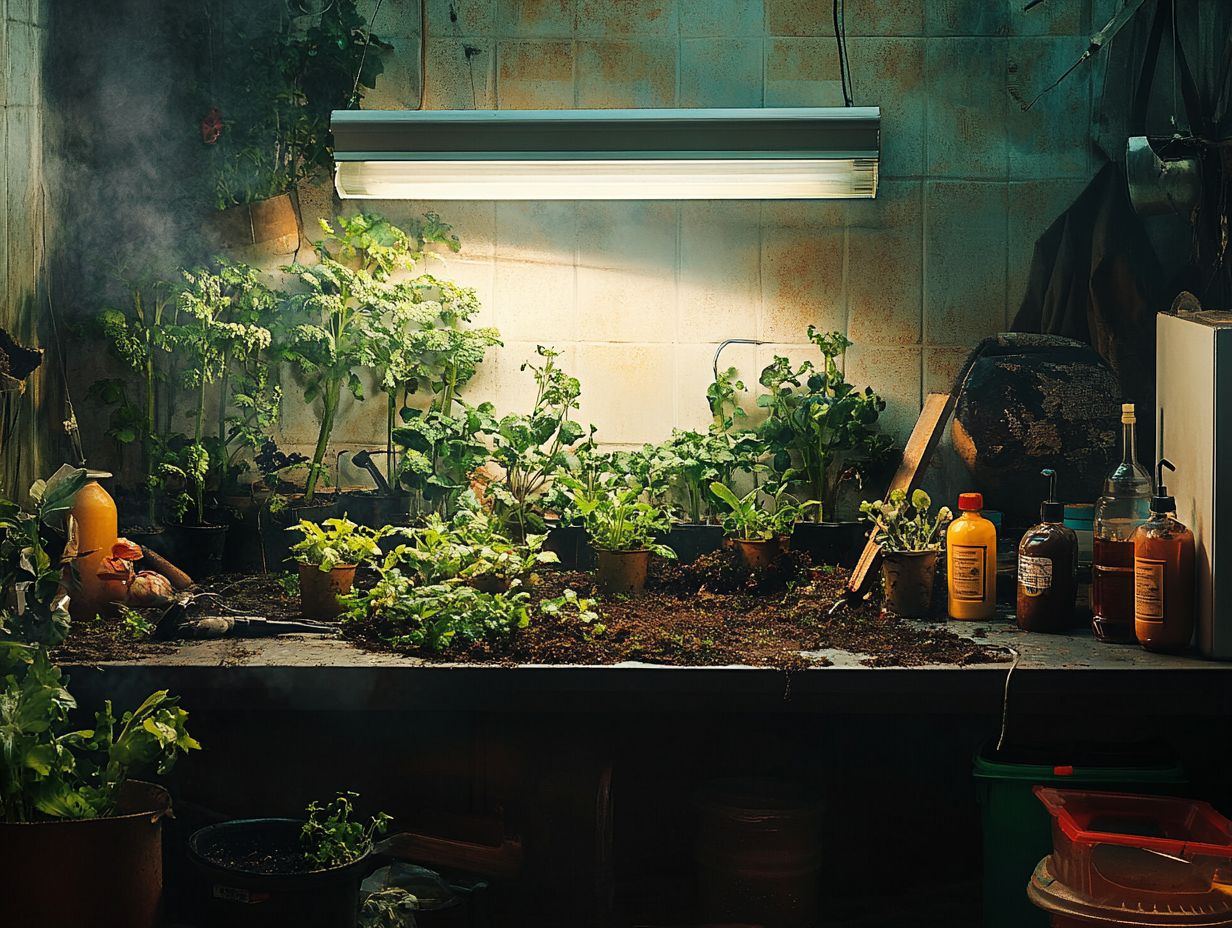
- Hydroponic gardening has several potential drawbacks, including environmental concerns and higher costs compared to traditional gardening methods.
- The impact of hydroponic gardening on ecosystems is a growing concern, as it often requires artificial lighting and chemical nutrients.
- While hydroponics can offer benefits for plant growth and use less water, it may not be the most sustainable or cost-effective option for everyone.
Overview of Hydroponic Gardening
Hydroponic gardening represents a groundbreaking approach to cultivating plants without the need for soil. It relies instead on a water with nutrients. This innovative method enables you to grow an array of crops, from vibrant vegetables to aromatic herbs, all within controlled environments.
It’s a compelling choice for urban gardening enthusiasts and those committed to sustainable food production. By eliminating the risk of soil-borne diseases and significantly reducing water usage, hydroponic systems address contemporary agricultural challenges. They ensure both nutrient efficiency and a premium quality food output.
Explanation of the Method
Hydroponics presents a sophisticated method for cultivating plants in a nutrient solution, entirely bypassing traditional soil. It harnesses the power of water and advanced technology to foster plant growth.
This innovative approach grants you precise control over nutrient formulations. You can deliver tailored ratios of essential minerals, such as nitrogen, phosphorus, and potassium, to meet the specific needs of various plant species. The meticulously balanced nutrient solutions promote healthier plants and accelerate growth cycles.
In hydroponic systems, energy consumption can be optimized through cutting-edge lighting and climate-control technologies. This guarantees that plants thrive under ideal conditions for photosynthesis, the process plants use to convert sunlight into energy.
Advantages of Hydroponic Gardening
Hydroponic gardening offers you a wealth of benefits compared to traditional farming methods. You’ll experience enhanced nutrient efficiency, reduced water consumption, and superior pest management all while embracing sustainable farming practices.
Benefits for Plants and Environment
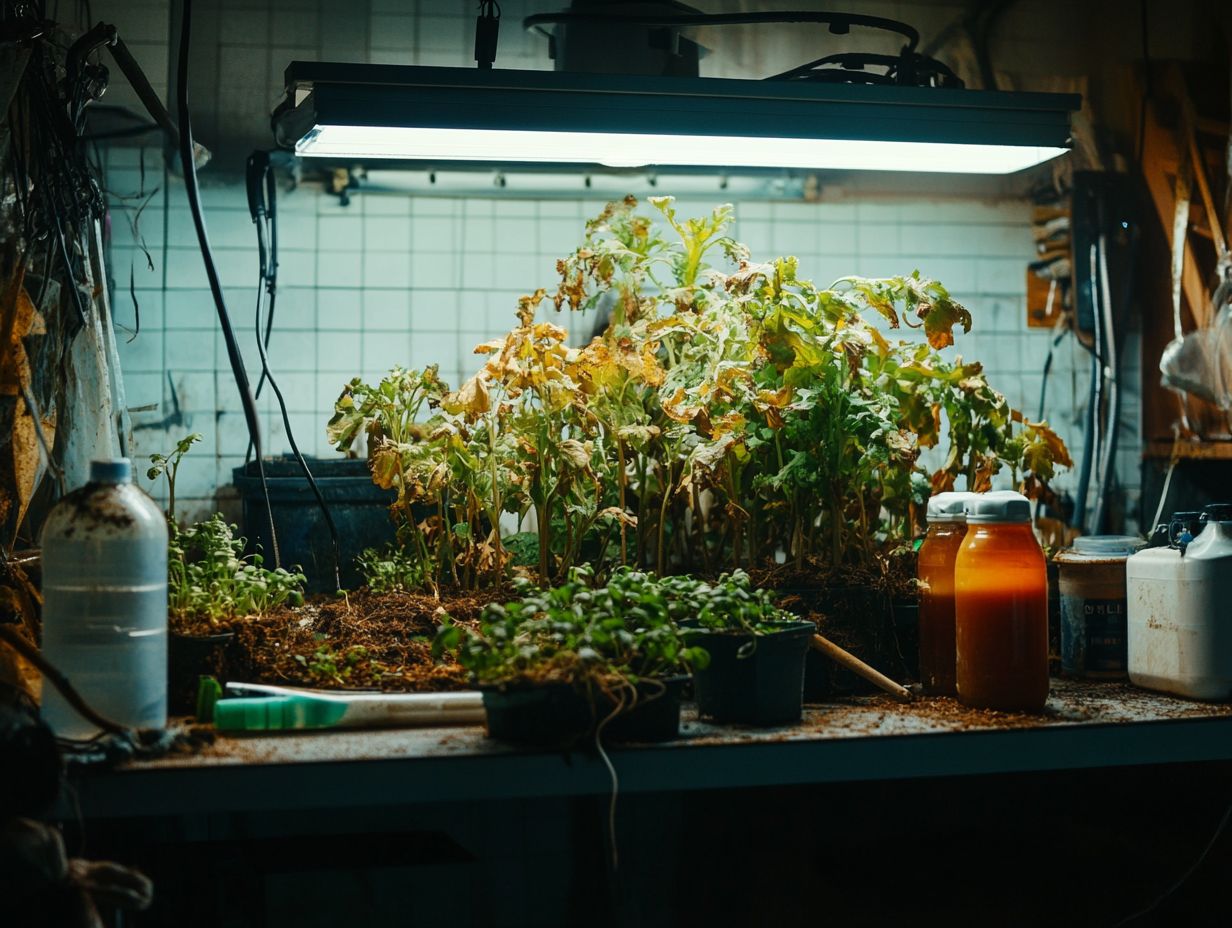
The benefits of hydroponic farming extend far beyond merely enhancing plant health; they play a vital role in environmental control by optimizing growing conditions and minimizing resource usage.
By embracing a soilless method, you gain the ability to precisely manage nutrients and water. This results in stronger, healthier plants. As urban populations continue to swell, adopting hydroponic systems becomes essential.
These systems not only promote sustainable food production but also significantly reduce the carbon footprint tied to traditional agriculture.
With hydroponics, you can cultivate high-quality produce even in limited spaces. This eliminates the need for harmful pesticides and fertilizers, enabling urban areas to develop more resilient food sources. This enhances food security and champions eco-friendly practices.
Ready to start your hydroponic journey? Embrace this modern method and grow your plants in exciting new ways!
Disadvantages of Hydroponic Gardening
While hydroponic gardening presents a host of advantages, it also comes with challenges. Be prepared for high energy consumption, a reliance on technology, and increased vulnerability to pest infestations.
Potential Drawbacks
A significant drawback of hydroponics is the need for effective pest management (keeping pests under control to protect plant health). Without soil, unique pest infestations and diseases can emerge. These challenges require your attention.
In hydroponic systems, where controlled environments are crucial, even minor lapses can lead to swift infestations. Implement vigilant monitoring techniques now to protect your plants!
Effective management strategies include integrated pest management (IPM) (a method using various tactics to control pests) and disease-resistant cropping systems. These strategies can help you navigate these challenges more smoothly.
By leveraging advanced technology think automated sensors and drone surveillance you can gain real-time insights into plant health and environmental conditions. This enables you to intervene promptly and safeguards your plants.
This proactive approach not only protects your plants but also fosters a sustainable hydroponic operation by minimizing reliance on harmful chemicals.
Environmental Concerns
Hydroponic gardening presents various environmental considerations. These include effects on local ecosystems and overarching implications for sustainable agriculture regarding climate change.
Impact on Ecosystems
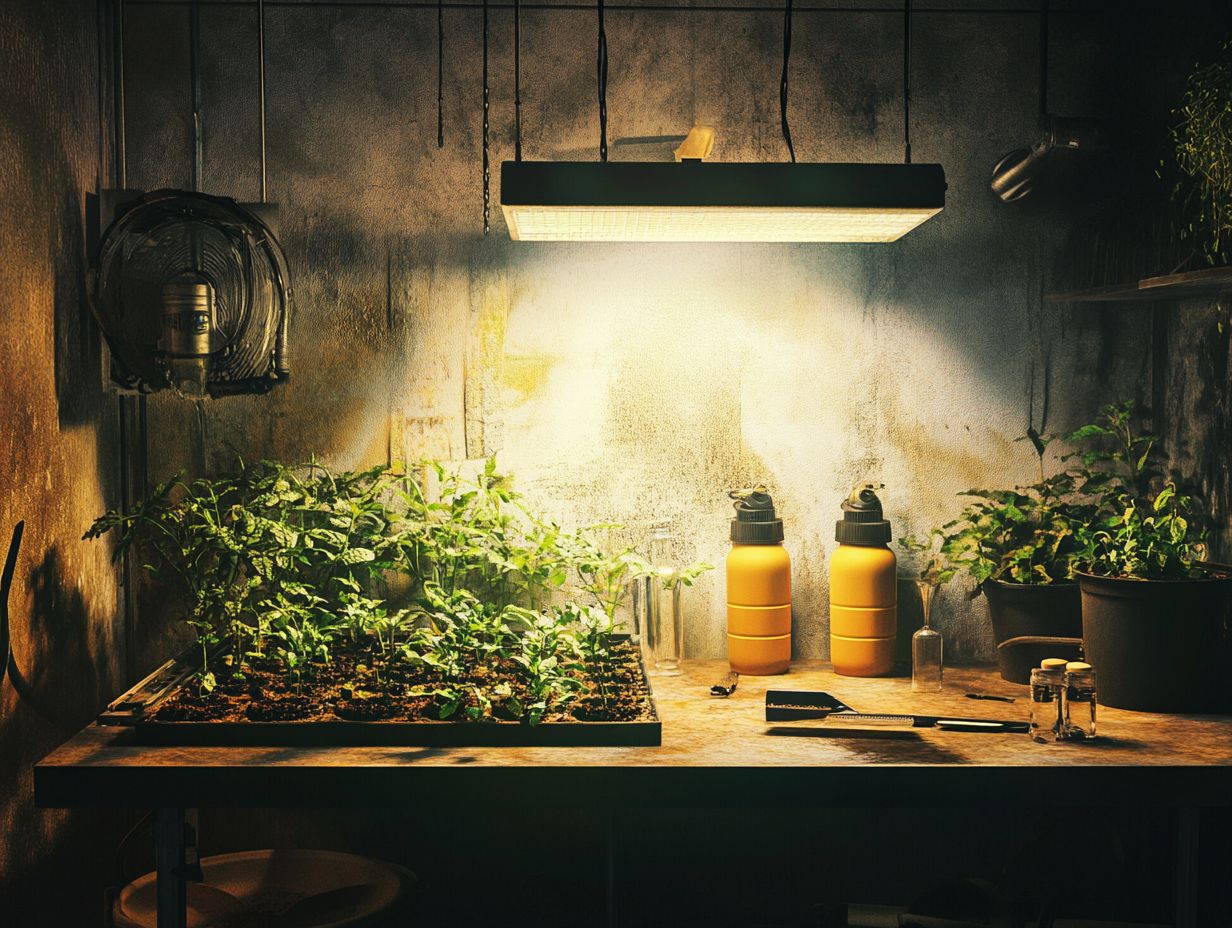
The impact of hydroponics on ecosystems is complex. It can reduce reliance on traditional soil-based agriculture, yet it also brings challenges like nutrient runoff and water consumption.
Using soil-less systems allows for efficient nutrient delivery directly to your plants. This can result in higher yields within smaller spaces, making it appealing for urban gardening initiatives.
Not only does this method conserve land, but it also minimizes pesticide use, promoting more sustainable farming practices. However, environmental challenges shouldn’t be brushed aside.
If not managed properly, hydroponic systems might contribute to issues like water scarcity or increased energy consumption for lighting and climate control. Therefore, it s essential to find a balance.
Adopting best practices can maximize benefits while minimizing potential drawbacks.
Cost Considerations
Cost considerations are vital in your decision-making process regarding adopting hydroponic farming. You’ll want to weigh these factors carefully against traditional gardening methods. Consider both the initial investments and the ongoing operational expenses.
Comparing Costs to Traditional Gardening
When comparing costs, hydroponic farming might initially seem pricier than traditional gardening due to the upfront investment in technology and ongoing energy expenses.
However, significant differences exist across various expense categories. Traditional gardening often faces seasonal fluctuations and weather-related challenges. These can lead to unpredictable costs tied to crop failures and pest management.
In contrast, hydroponic systems enable year-round cultivation, significantly minimizing the risk of loss. While you may need to invest more upfront for equipment like pumps and nutrient solutions, hydroponics can result in lower water usage and higher yields over time.
Thus, weighing the long-term benefits and potential savings, you might discover that investing in hydroponics presents a more sustainable and cost-effective solution in the long run.
Frequently Asked Questions
What are the Disadvantages of Hydroponic Gardening?
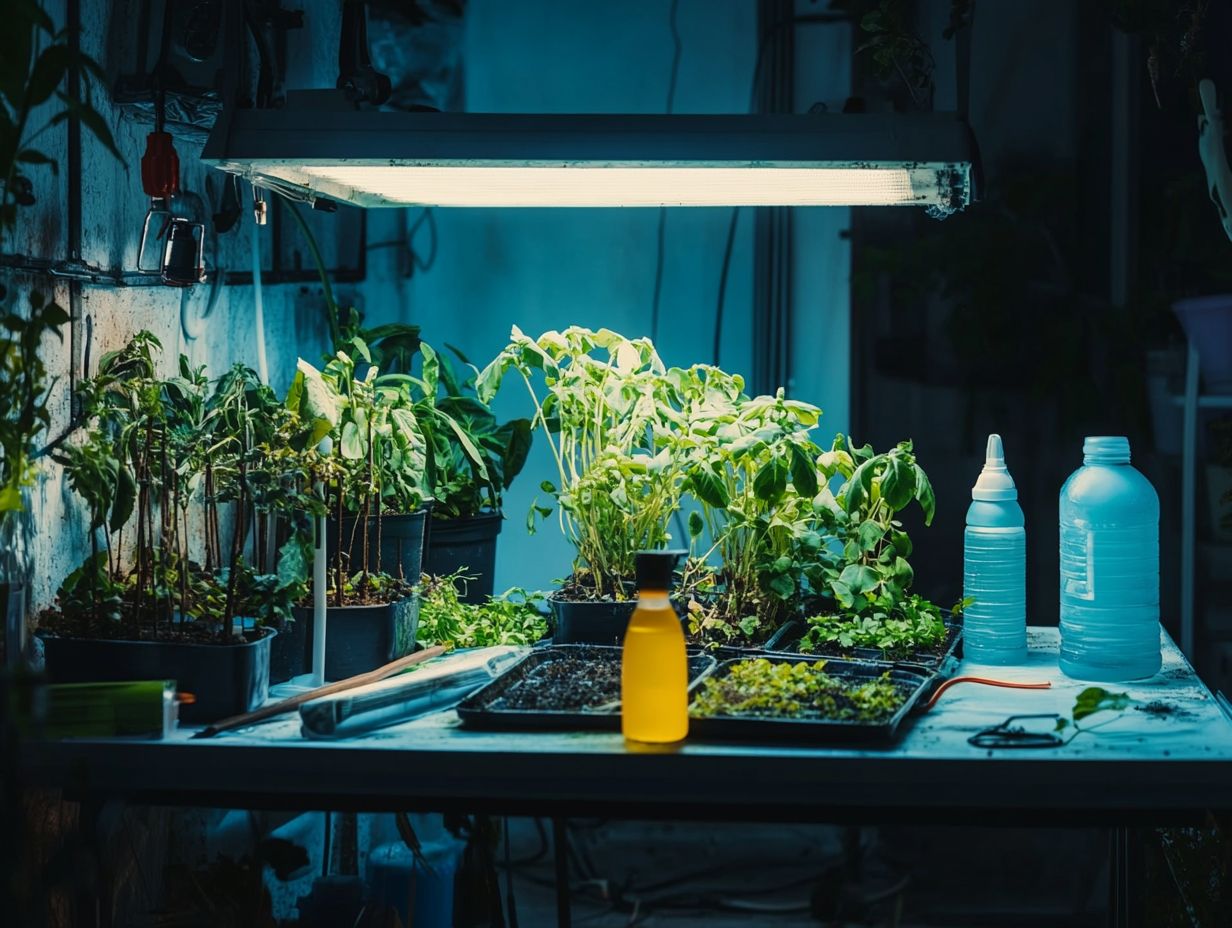
While hydroponic gardening has many benefits, there are also potential drawbacks to consider.
Is hydroponic gardening more expensive than traditional gardening?
Yes, hydroponic gardening often has higher initial setup costs compared to traditional gardening.
Are there any environmental concerns associated with hydroponics?
Hydroponic gardening can lead to pollution and waste due to plastic materials used in the systems.
Does hydroponic gardening require a lot of maintenance?
Hydroponic systems need regular monitoring to manage nutrient levels. This helps prevent problems like algae growth.
Are there any limitations to what types of plants can be grown hydroponically?
Not every plant is a good fit for hydroponics! For example, root vegetables can be tricky to grow without soil.
Is hydroponic gardening suitable for all climates?
Hydroponics is perfect for indoor gardening, especially in extreme weather. However, it may need extra energy for heating or cooling.

